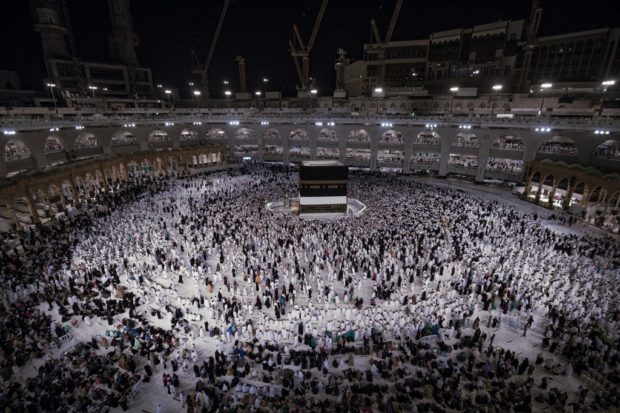Muslim solons want less gov’t involvement in Hajj pilgrim programs

Muslim pilgrims circumambulate around the Kaaba, Islam’s holiest shrine, during the annual Hajj pilgrimage at the Grand Mosque in Saudi Arabia’s holy city of Mecca on July 6, 2022. AFP file photo
MANILA, Philippines — Muslim lawmakers in the House of Representatives remained firm over calls to ease government involvement in preparations for the Hajj pilgrimage, amid several issues hounding the National Commission on Muslim Filipinos (NCMF).
During a press briefing on Tuesday, Lanao del Norte 1st District Rep. Mohamad Khalid Dimaporo said that investigations into Hajj issues have been persistent — noting that there has been at least one probe for every year’s edition of the pilgrimage.
The Hajj is an annual pilgrimage to Mecca in Saudi Arabia, which is required of capable Muslims for at least once in their lifetime. In the Philippines, the NCMF coordinates with Saudi Arabia officials regarding the participation of Muslims in the annual Hajj, but problems have prompted lawmakers to question if the government body is capable of effectively catering to the people’s needs.
With these problems, Dimaporo said they in the House committee on Muslim affairs support bills filed by Basilan Rep. Mujiv Hataman and Lanao del Norte 2nd District Rep. Sittie Aminah Dimaporo seeking to privatize the Hajj preparations.
“Every year, there’s a new Hajj. Every after Hajj, there’s a new investigation. So, we had one for the 2022 Hajj. We had an investigation for the 2023 Hajj. Now we are preparing for the 2024 Hajj,” Rep. Khalid Dimaporo who heads the committee on Muslim affairs said.
Article continues after this advertisement“Before this presscon, I came from the committee on public accounts and we were informed by the NCMF that there really is a danger that hajj 2024 might not occur because of all of these problems that are happening within the NCMF,” he added. “On the part of the House, the committee is proposing a possible solution and that is the bills filed by Reps. Mujiv Hataman and Sittie Aminah Dimaporo.”
Article continues after this advertisementREAD: Let private sector handle Hajj coordination, says lawmaker
Dimaporo was referring to the probe by the committee on public accounts, headed by chairperson and Abang Lingkod party-list Rep. Joseph Stephen Paduano, on the privilege speeches of Lanao del Sur 1st District Rep. Zia Alonto Adiong and Deputy Speaker Yasser Alonto Balindong last July 21, questioning the utilization of public funds for NCMF’s management of the Islamic pilgrimage.
At the hearing, Hataman questioned why NCMF is allowing potential pilgrims to make late and staggered payments when the Qur’an, Islam’s holy book, has noted that financially incapable Muslims are not required to make the pilgrimage.
“What I have observed with the NCMF is that they are very flexible with the timeline to the last minute, if someone asks that they be included in the list of pilgrims, and if someone pays at the last minute, they are included. So the timeline moves leading to these problems,” Hataman said.
“I think no Muslim would try to go on a Hajj if he or she cannot. That’s not allowed, in fact it’s a basic requirement for doing Hajj that you should be financially capable. You are not required to do the Hajj if you cannot. In fact, asking for loans is not allowed, so it shouldn’t be an issue if pilgrims cannot pay,” he added.
When one of the resource persons said that NCMF hijacked the 2024 Hajj preparations by not adhering with Saudi Arabia’s minimum 20 percent down payment of US$400 for four people, Hataman reiterated that Muslims should not force their way into the pilgrimage.
“I will repeat it, we are Muslims, we know the provisions in the Qur’an about Hajj, Let us not force our way and do the Hajj if we cannot, because that is not obligated of us. Only those who can afford are required to do Hajj, you cannot sell things or get loans just for the Hajj,” Hataman noted.
“My point is, if you have a timeline, if they are allowed to make a 20 percent down payment, I have observed that people doing the Hajj always pay in full. So why set a 20 percent down payment?” he asked.
Freedom of choice
Dimaporo also asked why Muslims are required to go through a government when Catholics can take on pilgrimages without the aid of the public sector.
“So, you have to think about it. Kayo are my Christian Catholic brothers, sisters. If you want to go on a religious pilgrimage to let’s say, to Israel, to see where Jesus was crucified, why do you have to go through a government agency?” Dimaporo asked.
“Why does a government agency have to dictate where you will stay and yung hotel mo and transportation mo? Shouldn’t it be freedom of choice?” he added.
Dimaporo said he hopes the bills privatizing the Hajj preparations are prioritized and eventually passed on final reading.
“Hopefully, it will be prioritized and it will pass into third reading before we adjourn, even better before the SONA. But that is one of the things that we hope to accomplish in the Committee of Muslim Affairs, the privatization of the Hajj,” Dimaporo said.
Hajj preparations handled by the NCMF have been affected by problems over the past years. In 2022, Hataman urged the 19th Congress to review NCMF’s Hajj pilgrimage coordination program after around 1,000 pilgrims were stranded in airports despite having tickets and passes.
READ: Thousands of Muslims going on hajj stranded at NAIA
The pilgrims, who said they had coordinated with NCMF for the holy trip, complained of not being able to secure travel visas.